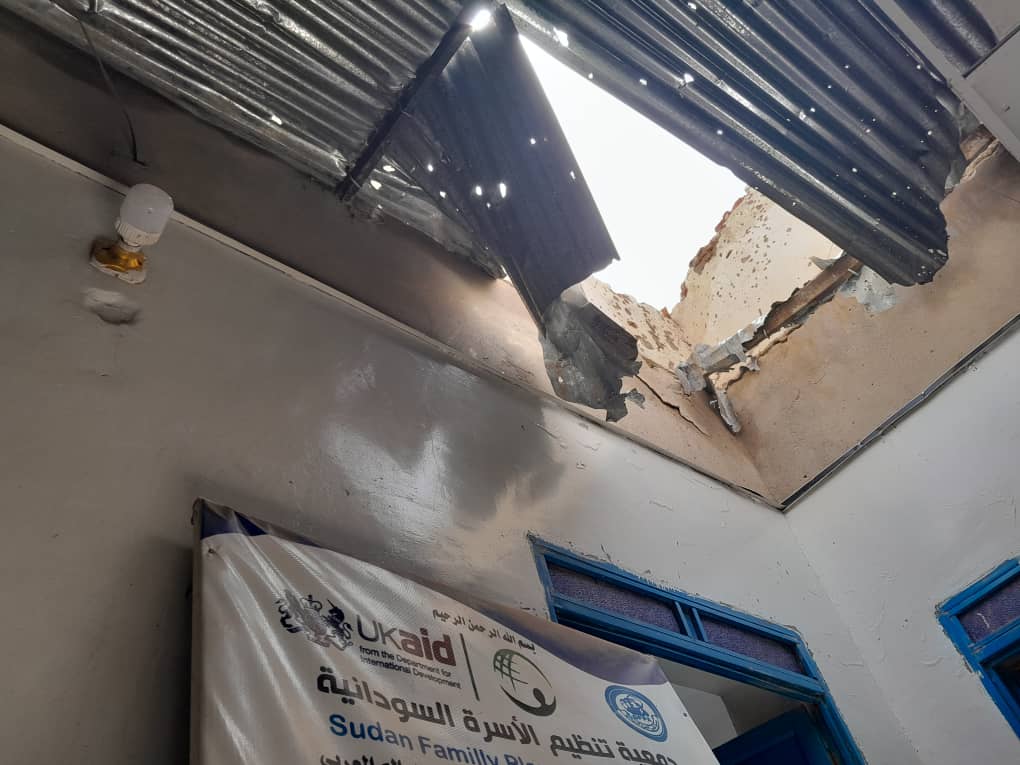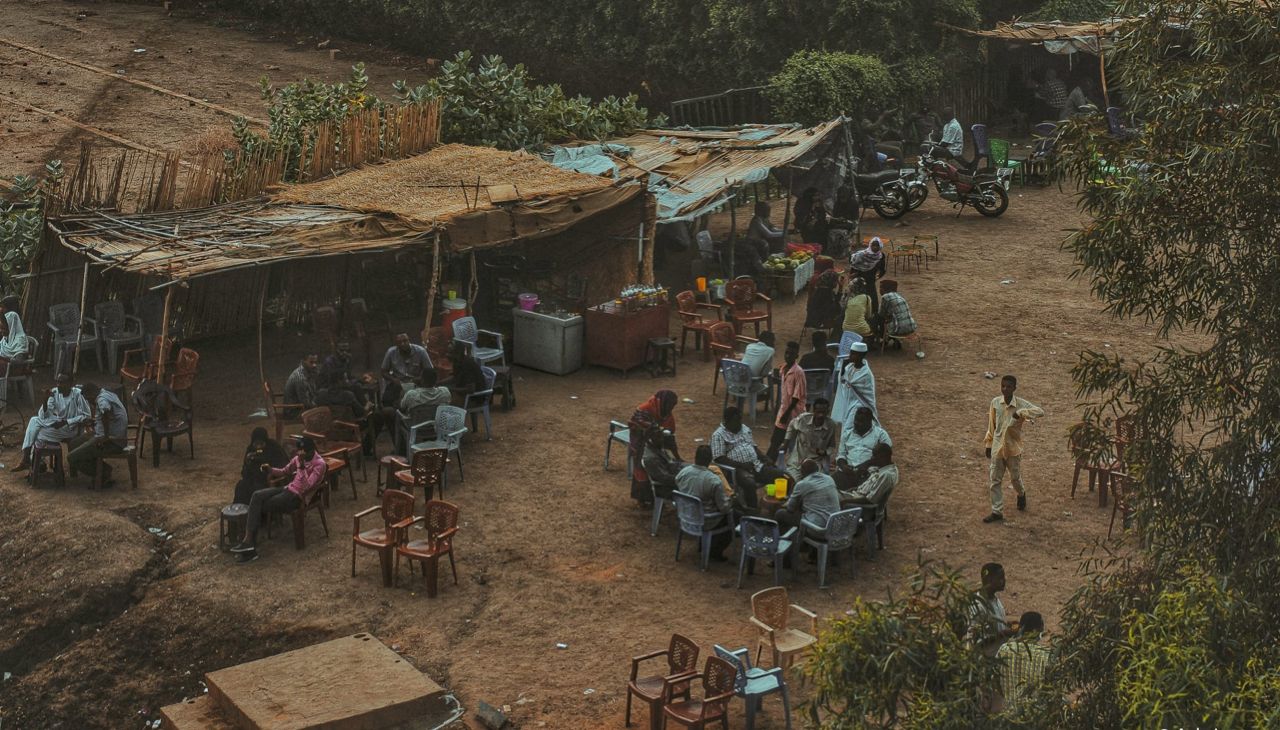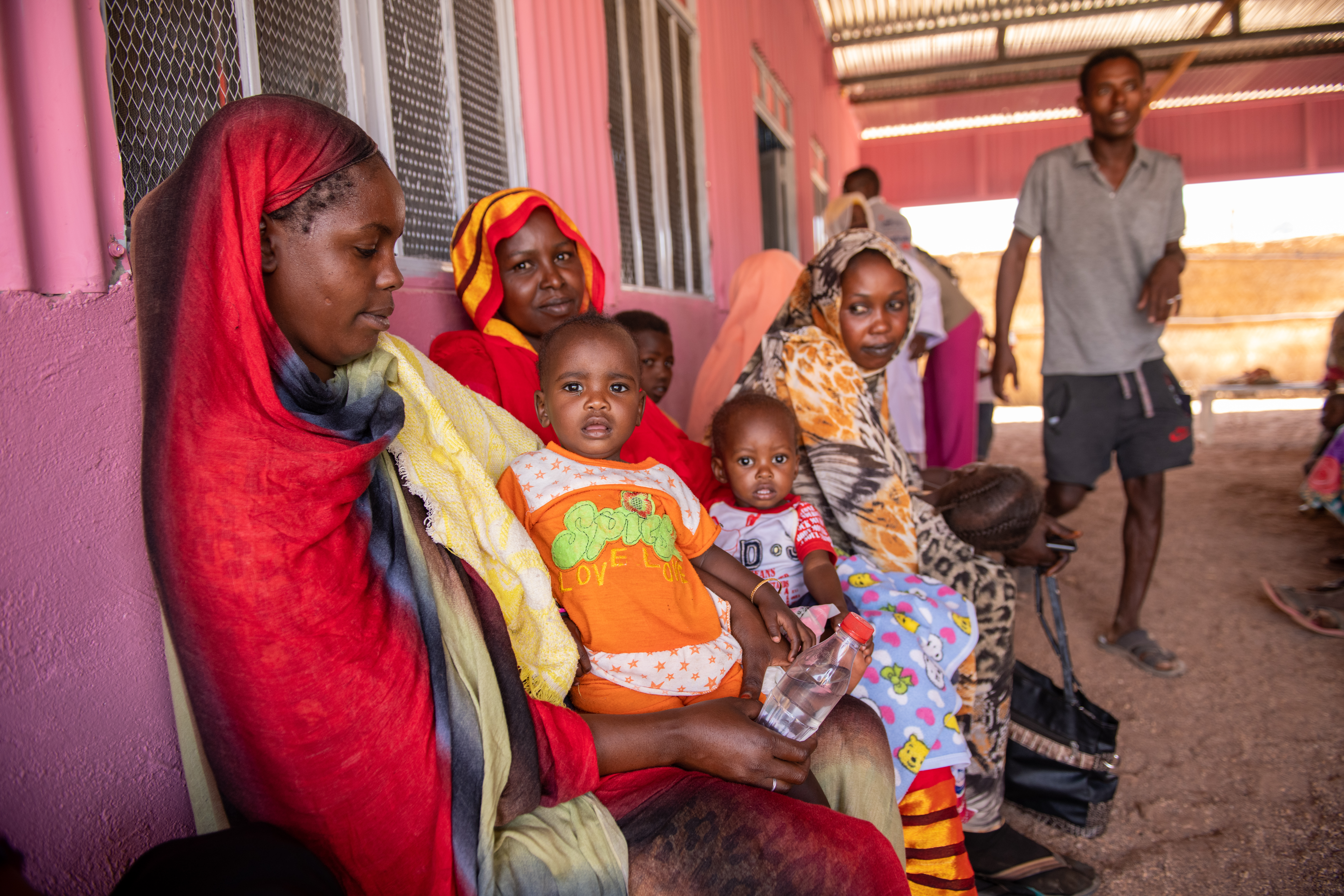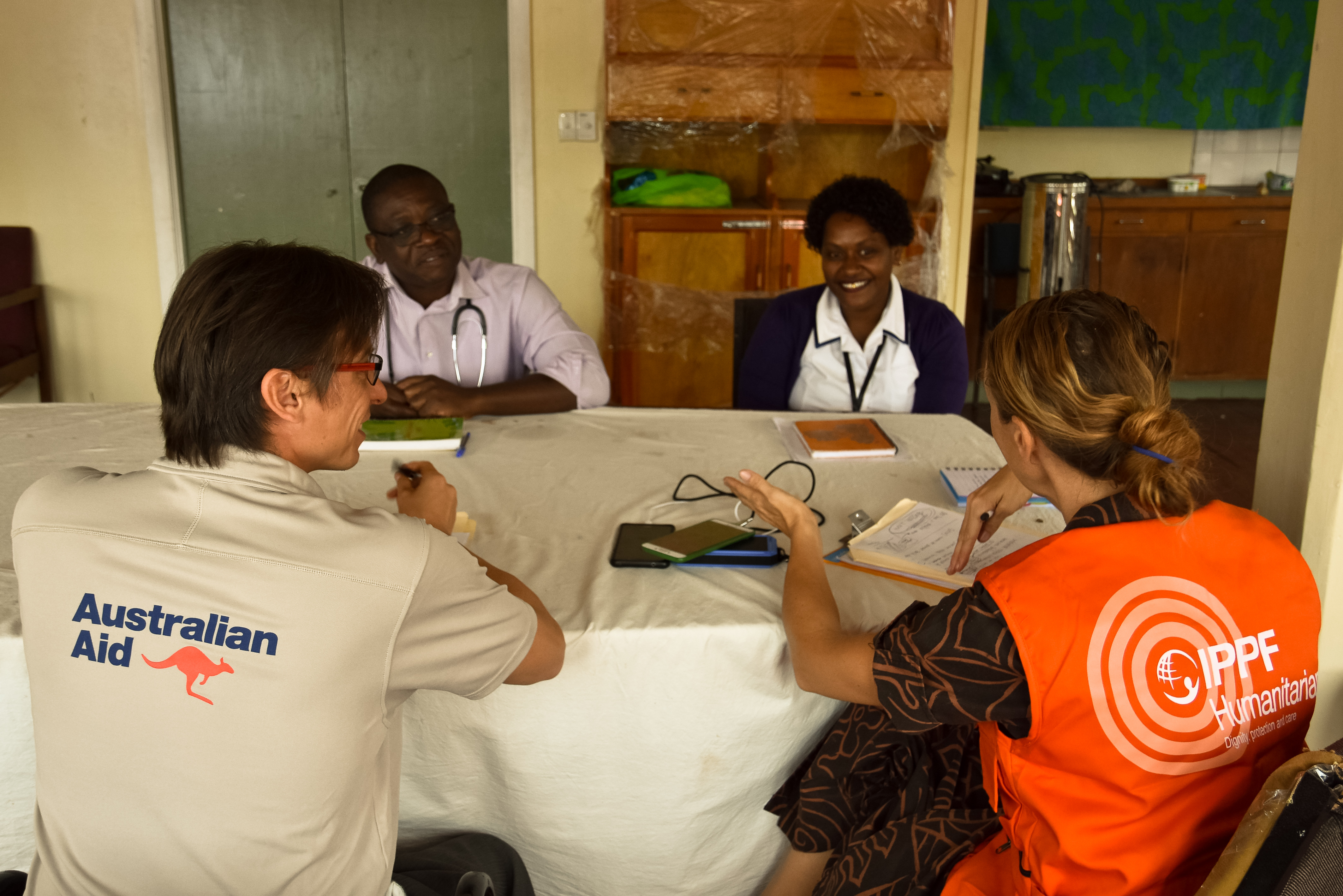
Articles by Sudan

Government of Japan awards IPPF $1.9 million to support women and girls affected by natural disasters and conflicts around the world
With support from the Government of Japan, International Planned Parenthood Federation’s (IPPF) Member Associations in five countries, namely Afghanistan, Palestine, Sudan, Ukraine and Yemen, will provide urgent sexual and reproductive health (SRH) services to communities affected by natural disasters and conflict situations. These IPPF Member Associations will: Provide sexual and reproductive health (SRH) and maternal and child health services for women and girls and marginalized communities in six remote and flood affected provinces in Afghanistan; Provide urgent sexual and reproductive health services to communities affected by the escalating violence in Palestine; Improve accessibility of services and community sustainability to decrease sexual and reproductive health-related mortality and morbidity of women and girls in three States with high internally-displaced populations in Sudan; Restore health facilities and access to maternal health services in conflict affected areas for populations affected by the destruction of the Kakhovka Dam in Ukraine; Provide critical sexual, reproductive and maternal health care to internally displaced people and local communities in Yemen. This vital funding from Japan will help with provision of badly needed but currently missing health services, especially for women, so that they can live with dignity and free from unwanted pregnancies, death of themselves and their newborns, and reproductive ill-health. It will allow us to provide essential and quality SRH and maternal and child health services in the communities, prevent and manage the consequences of sexual and gender-based violence, including the clinical management of rape, equip community-based midwives with skills to provide high quality obstetric and neonatal services and strengthen health information systems to collect high quality data to respond to the needs and priorities of women and girls’ health. IPPF Director General, Dr Alvaro Bemejo, said, "I offer heartfelt thanks to the Government of Japan for their unparalleled generosity to enable IPPF to respond to the needs of women and girls caught up in crises around the world. This generosity will allow IPPF and our local partners to provide a critical lifeline to the growing number of people in desperate need of humanitarian assistance." By the end of December 2024, IPPF, through our local partners in the five countries, will aim to deliver health services and information to at least 239,000 people in total. For further information, please contact Yuri Taniguchi, IPPF London Office, at [email protected]. Photo Credits: IPPF/Hannah Maule-ffinch/Sudan

Cases on the rise and vital life-saving treatments running low for Ethiopian refugees in Sudan living with HIV/AIDS
Since the influx of Ethiopian refugees into Sudan began in November 2020 following military unrest in the Tigray region, most humanitarian assistance has been focused on food, shelter, and primary health services. In response to this, the Sudan Family Planning Association (SFPA) established two clinics in Um Rakouba and Tunaydbah refugee camps to meet the needs of sexual and reproductive health (SRH) services. This includes comprehensive care of HIV/AIDS, allowing people living with HIV (PLHIV) to continue antiretroviral therapy (ARV) with privacy and confidentiality. Their services also involve the prevention and syndromic management of other sexually transmitted infections. The current emergency situation in Sudan has led to an estimated displacement of 7.6 million people across Sudan's 18 states, with over 13,000 reported deaths. This crisis is causing serious challenges to the already stretched health system. The increase of internally displaced people (IDPs) during the last nine months has also affected the provision of health services for the general population. The Government of Sudan, with the assistance of national and international partners, is going to huge efforts to ensure health coverage for IDPs and refugees. However, among the current national plans and funding, healthcare for HIV positive refugees is not adequately addressed. SFPA is also facing challenges providing SRH care, especially in the refugee camps, as they struggle to keep up with the numbers of IDPs - which are increasing dramatically by the day. SFPA provides SRH services in collaboration with the Sudan National AIDS Control Program (SNAP) and Al Gadarif SMOH. The total number of refugees living with HIV has now reached a tipping point, with 758 current cases recorded so far. So far, all clients have been able to regularly receive their ARV treatment. Many of them have reached zero viral load due to good adherence to treatment, meaning that the levels of HIV in the body are so low that the virus cannot be passed on. However, due to a shortfall of funding and resources, the risk of the discontinuation or interruption of ARVs may result in viral rebound, immune decompensation, and the progression of the virus. The higher percentage of newly discovered cases (10.4% of newly arrived refugees tested positive to HIV) also indicates that there is a new spread of HIV, not only amongst the youth population inside the camps, but also host communities. Given the current condition of refugee camps in Al Gadarif State, failure to adequately provide for people living with HIV/AIDS and prevent further transmissions may lead to catastrophic outcomes - not only in the camps but nationwide. About the Sudan Family Planning Association (SFPA) SFPA is a key SRH service provider in Sudan through its 15 branches covering 14 states1with a solid track record of delivering services in humanitarian settings. SFPA continues to fulfil its mandate and commitment to provide essential SRH and non- SRH services to refugees through an Australia Aid-supported emergency response to Ethiopian refugee crisis from 2021-2022 and continued with support from the Women’s Refugee Commission (WRC) until 31 December 2023, providing health services including testing, counselling, prevention of mother to child transmission, care and treatment services and ensure the enrolment of PLHIV in the ARVs regimen. Banner credits: IPPF/Hannah Maule-ffinch/Sudan

Demand for sexual and gender-based violence support quadruples amid Sudan’s ongoing conflict
Since the start of the brutal armed conflict between the Sudan Armed Forces (SAF) and the paramilitary Rapid Support Forces (RSF) in mid-April 2023, conflict-related rape and sexual violence against women and girls in Sudan has increased significantly. ‘I have witnessed firsthand the impact of this heinous war on our country’s most vulnerable people, including women, girls and other marginalized groups’, said Dr. Hiba Ahmed Khalil Badr, Director of Emergency and Humanitarian Interventions at the Sudan Family Planning Association (SFPA), IPPF’s local partner. The Rapid Support Forces (RSF) continue to use sexual violence against women and girls as one of the means of warfare in their conflict with the Sudan Armed Forces (SAF). Since April last year, the UN has reported an increase in all types of sexual and gender-based violence (SGBV) including mass rapes, gang rape, domestic violence, sexual exploitation and sexual slavery. Women and girls who are internally displaced are especially vulnerable to sexual violence in temporary shelters, border crossing or while fleeing between states for safety. The armed crisis has worsened the existing ethnic conflict, especially in West Darfur. The Arab-dominated RSF and allied Arab militiamen have targeted non-Arab communities like the Masalit in West Darfur. They have committed sexual violence against Masalit women and girls, including forced pregnancy, forced prostitution and sexual slavery. They have also specifically targeted local women human rights defenders, subjecting them to rape and sexual violence to punish and terrorize them.

Rapes, unplanned pregnancies and sexual and gender-based violence on the rise in Sudan’s forgotten war
Khartoum, 4 December 2023 — As the war in Sudan enters its eight month with no end in sight, widespread conflict-related sexual and gender-based violence (SGBV) has continued unabated, including reports of mass rapes, sexual exploitation and sexual harassment which demonstrate how sexual violence is being used as a tool of war to subjugate, terrorise and punish women and girls. Since the war between Sudan’s Rapid Support Forces and the Sudanese Armed Forces erupted on April 15th, reports of ethnically targeted sexual and gender-based violence have escalated across Sudan, leading to a surge in unplanned pregnancies and sexually transmitted infections. The International Criminal Court (ICC) in The Hague said in July it is investigating the hostilities in Darfur, including reports of killings, rapes and crimes against children. Rape has often been used as a weapon of war over the years in Sudan, human rights groups have said. Sexual violence is prohibited in conflict, and the accounts of rape could constitute war crimes and crimes against humanity. The prevailing conflict and social unrest in various regions of Sudan have created an environment rife for SGBV, leaving countless individuals exposed to the gravest violations of their most intimate rights. Deeply disturbing accounts of gang rapes, sexual assault, harassment, and other forms of sexual, physical and psychological violence have emerged, highlighting the urgent need for comprehensive sexual and reproductive healthcare for survivors. IPPF’s local member association in Sudan, the Sudan Family Planning Association (SFPA) has been providing these services across Sudan since the outbreak of the war, including counselling, medical assistance, and referrals for survivors of SGBV. Despite unprovoked attacks on six SFPA facilities which have so far killed one youth volunteer and injured numerous clients and staff, as well as interrupted the delivery of some health services, SFPA has continued to work in conflict-affected areas through their large network of community based distributors and mobile clinics. Dr Seham Jaber, the director of Digital Health Interventions and Services at SFPA said: “We have noticed escalating rates of sexual and gender-based violence in Sudan since the outbreak of the war in April. Violence against women and girls is occurring at the hands of militants, as well as an increase in domestic and intimate partner violence, including rape. Young girls and boys are living in overcrowded shelters are reporting to us cases of sexual harassment and abuse." Confidentiality, sensitivity and compassion are crucial to SFPA’s work, because many survivors of sexual violence don’t seek medical treatment due to the fear of social stigma and reprisals. SFPA's website and hotline have seen a considerable increase in traffic for reports of SGBV from the community since the start of the war. In response, SFPA is also running community awareness and education campaigns on SGBV, and is enlisting the support of local Imams to promote gender equality, and foster a culture of respect and consent. For media inquiries or to speak to one of our staff in Sudan, please contact [email protected] About the Sudan Family Planning Association The Sudan Family Planning Association (SFPA) was established in 1965 by pioneers in obstetrics and gynecology in response to increases in maternal, neonatal and infant mortality and morbidity. Sudan is a country in great need of frontline sexual and reproductive health (SRH) services. In 2022, SFPA provided 26 million services through 24 clinics, 261 associated clinics, and 37 mobile clinics. Since the start of the war on 15 April 2023; the Association teams have been successful in providing 14,706,000 services through 24 SFPA facilities , mobile clinics, mobile teams ,CBDs and partners clinics . SFPA was able to assist 1,145 deliveries under bombardment and provided 167,000 treatments of HIV&AIDS “HIV screening and care for PLHIV” through its static clinics. Mobile clinics are used to offer integrated SRH services including HIV/STI services and condom distribution, STI testing and management, HIV testing and treatment for HIV opportunistic infections, referrals for ARV treatment including PMTCT and awareness sessions both at mobile clinics and at the community level by community health promoters and community base distributors (CBDs). About the International Planned Parenthood Federation IPPF, through its 149 Member Associations and collaborative partners, delivers high-quality sexual and reproductive healthcare and helps advance sexual and reproductive rights, especially for marginalized people with diverse needs that are currently unmet. IPPF's Member Associations and partners are locally owned, independent organisations, which means the support and care they provide are informed by local expertise and context. IPPF advocates for a world where people have the information they need to make informed decisions about their sexual and reproductive health and their bodies. We stand up and fight for sexual and reproductive rights and against those who seek to deny people their human right to bodily autonomy and sexual and reproductive freedom. We deliver care rooted in rights, respect, and dignity for all - no matter what.

IPPF Statement on RSF Attacks Against Sudan Family Planning Association Health Facilities
Statement from Dr Alvaro Bermejo, IPPF Director General: The International Planned Parenthood Federation condemns the multiple attacks in Khartoum and Elfashir (North Darfur) against clinics and health centers run by the Sudanese Family Planning Association (SFPA) between 7-9 September. Unprovoked attacks against the health facilities in South Khartoum (Elshik Wad Hamad) and in Elfashir City (Aboshok Clinic) have destroyed the infrastructure of the facilities, injured clients and staff, and interrupted the delivery of the most needed health services for vulnerable people of Sudan, especially women and girls of reproductive age. These attacks, just like the previous attacks against health facilities and medical professionals since the outbreak of violence in the country began on 15 April, will prolong the suffering of the Sudanese people. IPPF requests the protection of civilians and civilian institutions, especially healthcare facilities, to ensure the provision of healthcare and the basic humanitarian necessities for the Sudanese people. For media requests, contact [email protected] About the Sudan Family Planning Association The Sudan Family Planning Association (SFPA) was established in 1965 by pioneers in obstetrics and gynecology in response to increases in maternal, neonatal and infant mortality and morbidity. As the statistics show, Sudan is a country in great need of frontline sexual and reproductive health (SRH) services. Advocacy, and undertaking information, education and communication (IEC) programs are critical. In 2022, SFPA provided 26 millions of services through 24 clinics, 261 associated clinics, and 37 mobile clinics . Since the start of the crisis in 15th April; the association teams was successful in providing 2,500,000 services through 24 SFPA facilities and 8,500,000 services through non damaged associated and mobile clinics. SFPA was able to assist 1145 deliveries under bombarding and provided 167000 treatments of HIV in its static clinics.

Eyes on Sudan: Africa’s second largest asylum country now faces its own refugee crisis
By Dr. Hiba Ahmed Khalil Badr, Director of Emergency and Humanitarian Interventions, Sudan Family Planning Association Sudan has a long record of generously hosting refugees. At the beginning of 2023, Sudan was the second largest asylum country in Africa with over 1.11 million refugees. Most of these people came from nearby countries including South Sudan, Eritrea, Ethiopia, Central African Republic, Chad, Syria, and Yemen. But now, Sudan is the origin of one of the world’s largest refugee crises. The descent into war between the Sudanese Armed Forces (SAF) and the paramilitary Rapid Support Forces (RSF) in the capital Khartoum on 15 April has already displaced nearly 2 million people, according to the UN. While security issues and bureaucratic hurdles have prevented the majority of humanitarian aid from reaching innocent refugees and internally-displaced Sudanese people, local organizations and volunteers continue to shoulder most of the relief work. As the Director of Emergency and Humanitarian Interventions with the Sudan Family Planning Association (SFPA), I have witnessed firsthand the impact of this heinous war on our country’s most vulnerable people, including our women, girls and other marginalized groups.

Ethiopian refugees find help in the clinic with pink walls
It's mid-morning, and the Um Rakuba refugee camp on the southern border of Sudan is hot. There are few trees to take shade from the 40°c heat. The dusty main road is bordered on both sides by rows upon rows of huts and tents, temporary accommodation established by The United Nations High Commissioner for Refugees (UNHCR) for the tens of thousands of refugees who have fled over the border from neighbouring Ethiopia since fighting broke out between government forces and the Tigray People’s Liberation Front (TPLF) in November 2020. The severe humanitarian crisis has left more than 5 million people facing starvation. This week, peace talks mediated by the African Union are taking place in South Africa in an aim to break the bitter impasse between the Tigray region and the Ethiopian federal governments and bring succour to the desperate people caught in the middle. Many arrivals tell of being victims of armed groups, facing perilous situations, including looting of their houses, forceful recruitment of men and boys and sexual violence against women and girls. Refugees are arriving with little more than the clothes on their backs, fatigued and in weak conditions after sometimes days of travel. The main road of the camp is peppered with the temporary offices of well-known charities, some providing food aid, others medical care. But there is only one clinic that has bright pink walls and welcomes women, girls, and men inside for free sexual and reproductive healthcare. The Sudan Family Planning Association (SFPA) quickly established a presence here once refugees started to arrive as they understood sexual and reproductive health is not only vital for women’s health and safety but very often overlooked by the humanitarian community.

In pictures: The Women of Tigray
The civil war in the Tigray region of Ethiopia began in November 2020, causing tens of thousands of people to flee. There are currently over 21,000 refugees in Um Rakuba camp, where the Sudan Family Planning Association (SFPA) has established a sexual and reproductive healthcare clinic for refugees and the host community. Community mobilizers visit the camp daily to let women know about the clinic, which provides pregnancy testing, pre- and post-natal care (including ultrasounds), HIV and STI testing and care, and both long and short acting contraceptives. This collection of portraits captures the strength, grace, and dignity of the women, despite the horrendous trauma they have experienced and the circumstances they now live in. Photography ©IPPF/Hannah Maule-Ffinch.

SPRINT: Sexual and reproductive health in crisis and post-crisis situations
The SPRINT Initiative provides one of the most important aspects of humanitarian assistance that is often forgotten when disaster and conflicts strike: access to essential life-saving sexual and reproductive health services. We build capacity of humanitarian workers to deliver essential life-saving sexual and reproductive health services in crisis and post-crisis situations through the delivery of the Minimum Initial Service Package (MISP) for reproductive health in emergencies. Through funding from the Australian Government's Department of Foreign Affairs and Trade (DFAT), our SPRINT Initiative has brought sexual and reproductive health to the humanitarian agenda, increased capacity and responded to a number of humanitarian emergencies. Australia has funded the SPRINT initiative since 2007. Since then, the SPRINT initiative has responded to 105 humanitarian crises and worked with partners in 99 countries. SPRINT has reached over 1,138,175 people, delivering 2,133,141 crucial SRH services, and continues to respond to ongoing emergencies. In each priority country, we work with an IPPF Member Association to coordinate and implement life-saving sexual and reproductive activities. Through these partnerships, SPRINT helps strengthen the enabling environment, improve national capacity and provide lifesaving services during times of crisis. You can read more about IPPF Humanitarian’s Programme here. Australia's location in the Indo-Pacific provides DFAT with a unique perspective on humanitarian action. Australia is committed to helping partner governments manage crisis response themselves. This is done through building the capacity of the national government and civil society to be able to respond to disaster. DFAT also works with experienced international partners to prepare for and respond to disasters, including other donors, United Nations agencies, the International Red Cross and Red Crescent Movement and non-government organisations.

In pictures: Innovating during COVID-19
Women around the world have faced multiple barriers to accessing safe abortion care during the COVID-19 pandemic including the de-prioritization of sexual and reproductive healthcare, overwhelmed health systems and restrictions on movement. The COVID-19 crisis has sparked innovation among IPPF Member Associations who responded swiftly by developing new approaches to reach women with safe abortion care including telemedicine and home-based provision of medical abortion. Strong evidence generated from this work supports the continuation and strengthening of these approaches beyond the end of the pandemic. Cameroon Cameroon National Planning Association for Family Welfare (CAMNAFAW) To ensure that quality abortion care can be provided to women during travel restrictions, CAMNAFAW’s service providers travel to partner clinics in underserved areas and to clients’ homes to provide medical and surgical abortion care. This model of taking safe abortion care closer to women will continue even with easing of travel restrictions, as this has been found to be an effective and acceptable approach to increasing access.Photo: IPPF/Xaume Olleros/Cameroon Share on Twitter Share on Facebook Share via WhatsApp Share via Email Guinea Association Guinéenne pour le Bien-Etre Familial (AGBEF) Building on lessons learned during the Ebola crisis in Guinea, AGBEF quickly took measures to prevent infection in its clinics to continue providing sexual and reproductive healthcare, including surgical and medical abortion, in a safe environment. AGBEF donated protective materials to communities, including hand-washing stations, face masks and antibacterial gel, alongside messaging on infection prevention. This community visibility reassures clients they can safely attend AGBEF clinics for abortion and contraceptive care.Photo: AGBEF/Guinea Share on Twitter Share on Facebook Share via WhatsApp Share via Email India Family Planning Association of India (FPA India) FPA India and partners advocated to have sexual and reproductive healthcare, including abortion, recognized as essential by the government, which meant FPA India could continue healthcare delivery during the national lockdown. To reduce in-person clinic visits, FPA India established teleconsultation and counselling for abortion care, and is continuing to provide in-clinic care for both medical and surgical abortion. Photo: IPPF/Alison Joyce/India Share on Twitter Share on Facebook Share via WhatsApp Share via Email Nepal Family Planning Association of Nepal (FPAN) FPAN and partners advocated for interim approval of home provision of medical abortion and telemedicine for abortion counselling during COVID-19. FPAN is now implementing these approaches, ensuring continued access to abortion care in Nepal, where many people live in remote locations with limited mobility, which has been further restricted by COVID-19 lockdowns. Photo: FPAN/Nepal Share on Twitter Share on Facebook Share via WhatsApp Share via Email Pakistan Rahnuma – Family Planning Association of Pakistan (Rahnuma-FPAP) Rahnuma-FPAP and partners successfully advocated for the government to class sexual and reproductive healthcare as ‘essential’, which enabled the team to continue providing post-abortion care during the pandemic. Rahnuma-FPAP expanded its telemedicine and home-based provision for menstrual regulation counselling and post-abortion care. These new approaches have ensured continued access to services for clients unable to reach clinics.Photo: Rahnuma-FPAP/Pakistan Share on Twitter Share on Facebook Share via WhatsApp Share via Email Palestine Palestinian Family Planning and Protection Association (PFPPA) In response to the government-mandated closure of its clinics, PFPPA quickly established a toll-free call centre which provides consultations, counselling, referrals and follow-up, including consultation for abortion care through a harm reduction approach, ensuring that women are provided with accurate information. Due to its success, PFPPA is exploring options for continuing this healthcare delivery model beyond the pandemic, with the aim of keeping it free of charge for users.Photo: SAAF/Samar Hazboun/Palestine Share on Twitter Share on Facebook Share via WhatsApp Share via Email Sudan Sudan Family Planning Association (SFPA) Following a nation-wide shutdown in April, SFPA established a call centre to increase access to healthcare, including abortion and contraceptive counselling and referrals. An unexpected outcome of the new call centre is that it has reached an increased number of young women who regularly call to discuss their reproductive health and rights. SFPA is working towards institutionalizing this model for continuation beyond the pandemic.Photo: SFPA/Sudan Share on Twitter Share on Facebook Share via WhatsApp Share via Email Togo Association Togolaise pour le Bien-Etre Familial (ATBEF) ATBEF adapted its mobile application ‘Infos Ado Jeunes’, adding a toll-free teleconsultation service for young clients to use to access abortion consultations and pre- and post-abortion counselling. This app has given young clients ongoing access to care when they face challenges travelling to clinics. It has also eased overall client flow in clinics at a time when social distancing is being implemented.Photo: ATBEF/Togo Share on Twitter Share on Facebook Share via WhatsApp Share via Email







